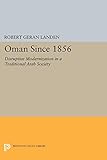Oman Since 1856 / Robert Geran Landen.
Material type: TextSeries: Princeton Legacy Library ; 2286Publisher: Princeton, NJ : Princeton University Press, [2015]Copyright date: ©1967Description: 1 online resource (506 p.)Content type:
TextSeries: Princeton Legacy Library ; 2286Publisher: Princeton, NJ : Princeton University Press, [2015]Copyright date: ©1967Description: 1 online resource (506 p.)Content type: - 9780691623122
- 9781400878277
- 953/.5 22
- DS247.O67 L3eb
- online - DeGruyter
- Issued also in print.
| Item type | Current library | Call number | URL | Status | Notes | Barcode | |
|---|---|---|---|---|---|---|---|
 eBook
eBook
|
Biblioteca "Angelicum" Pont. Univ. S.Tommaso d'Aquino Nuvola online | online - DeGruyter (Browse shelf(Opens below)) | Online access | Not for loan (Accesso limitato) | Accesso per gli utenti autorizzati / Access for authorized users | (dgr)9781400878277 |
Browsing Biblioteca "Angelicum" Pont. Univ. S.Tommaso d'Aquino shelves, Shelving location: Nuvola online Close shelf browser (Hides shelf browser)

|

|

|

|

|

|

|
||
| online - DeGruyter NATO and American Security / | online - DeGruyter Norway-Sweden : Union, Disunion, and Scandinavian Integration / | online - DeGruyter Office of the Prime Minister / | online - DeGruyter Oman Since 1856 / | online - DeGruyter On the Use of Philosophy : Three Essays / | online - DeGruyter On Wordsworth's Prelude / | online - DeGruyter Opposition to Louis XIV : The Political and Social Origins of French Enlightenment / |
Frontmatter -- Preface -- Contents -- Abbreviated titles of Often-quoted works -- PART I. Introduction: Oman and the Old Order in the Persian Gulf -- 1. The Premodern Persian Gulf -- 2. Oman Before the Late Nineteenth Century -- PART II. The Impact of Early Economic and Technological Modernization -- 3. The Beginnings of Modernization in the Persian Gulf -- 4. Economic Change in Oman During the Late Nineteenth Century -- PART III. The Consolidation of British Political Paramountcy in Oman and the Persian Gulf -- 5. The Evolution of Indirect Rule, 1862-92 -- 6. The Defense of British Predominance, 1892-1903 -- PART IV. Oman's Political Accommodation to a New Age -- 7. Collapse of the Moderate Regime, 1856-71 -- 8. Reconstruction of the Moderate Regime, 1871-1903 -- 9. Epilogue: Oman in the Twentieth Century -- Bibliographical Notes -- Index
restricted access online access with authorization star
http://purl.org/coar/access_right/c_16ec
Oman, a state in southeastern Arabia, is a prime example of a country that has not benefited greatly from modernization, but instead has fallen into economic and political insignificance as a result of economic and technological innovations introduced by the West. Prior to the nineteenth century Mr. Landen finds that native Omanis had developed a thriving maritime industry which was responsible for the country's economic health. With the advent of colonialism from the West, Oman's fortunes declined. The changes that took place, the influence of British leaders who directed the political activities in Oman, and the internal politics of Oman are all considered. The last chapter contains speculations on the effect of the discovery of oil on the future of Oman.Originally published in 1967.The Princeton Legacy Library uses the latest print-on-demand technology to again make available previously out-of-print books from the distinguished backlist of Princeton University Press. These editions preserve the original texts of these important books while presenting them in durable paperback and hardcover editions. The goal of the Princeton Legacy Library is to vastly increase access to the rich scholarly heritage found in the thousands of books published by Princeton University Press since its founding in 1905.
Issued also in print.
Mode of access: Internet via World Wide Web.
In English.
Description based on online resource; title from PDF title page (publisher's Web site, viewed 30. Aug 2021)


